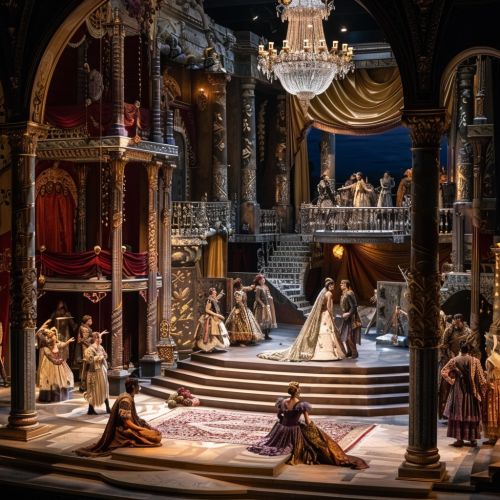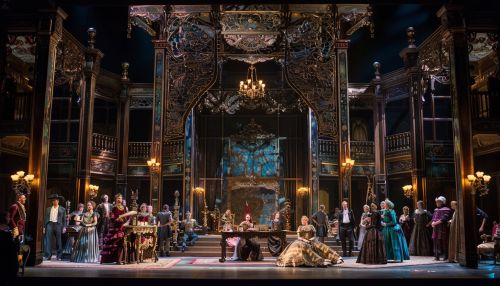Utah Opera
History
Utah Opera, founded in 1978 by Glade Peterson, is a professional opera company based in Salt Lake City, Utah. The organization has grown significantly since its inception, becoming a vital part of the cultural fabric of the region. The company's mission is to promote and present opera of the highest quality, fostering an appreciation for the art form through performances, educational programs, and community engagement.
The company initially focused on producing standard operatic repertoire, but over the years, it has expanded its offerings to include contemporary works and American operas. This diversification has allowed Utah Opera to reach a broader audience and contribute to the evolution of opera as an art form. The company's commitment to artistic excellence has been recognized through numerous awards and accolades, solidifying its reputation as a leading opera company in the United States.
Repertoire and Productions
Utah Opera's repertoire includes a wide range of operatic works, from classic masterpieces by composers such as Verdi, Mozart, and Puccini, to contemporary operas by living composers. The company typically produces four mainstage operas each season, performed at the Janet Quinney Lawson Capitol Theatre in Salt Lake City.
In addition to its mainstage productions, Utah Opera also presents smaller-scale works and chamber operas in various venues throughout the state. These performances often feature emerging artists and provide opportunities for audiences to experience opera in more intimate settings.


Artistic Leadership
The artistic leadership of Utah Opera has played a crucial role in shaping the company's vision and direction. Over the years, the company has been led by several distinguished general directors and music directors who have brought their unique perspectives and expertise to the organization.
One of the most influential figures in the company's history is Christopher McBeth, who has served as the Artistic Director since 2003. Under his leadership, Utah Opera has expanded its repertoire, increased its focus on American operas, and enhanced its educational and community outreach programs. McBeth's commitment to artistic excellence and innovation has been instrumental in the company's continued success.
Educational and Community Programs
Utah Opera is dedicated to fostering a love for opera through its extensive educational and community programs. These initiatives are designed to engage audiences of all ages and backgrounds, providing opportunities for learning and participation.
One of the company's flagship educational programs is the Resident Artist Program, which offers emerging opera singers and pianists the opportunity to receive advanced training and performance experience. Participants in the program perform in mainstage productions, educational outreach events, and community concerts, gaining valuable experience and exposure.
In addition to the Resident Artist Program, Utah Opera offers a variety of educational initiatives for students and teachers, including in-school performances, workshops, and masterclasses. These programs aim to introduce young people to the world of opera and inspire the next generation of opera enthusiasts.
Collaborations and Partnerships
Utah Opera frequently collaborates with other arts organizations and institutions to enhance its productions and reach new audiences. One of the company's most significant partnerships is with the Utah Symphony, with which it merged in 2002 to form the Utah Symphony | Utah Opera organization. This collaboration has allowed both organizations to pool their resources and expertise, resulting in higher-quality productions and increased community engagement.
The company also partners with local schools, universities, and community organizations to provide educational and outreach programs. These partnerships help to expand the reach of Utah Opera's initiatives and ensure that opera remains an accessible and vibrant art form in the region.
Financial and Operational Structure
Utah Opera operates as a non-profit organization, relying on a combination of ticket sales, donations, grants, and sponsorships to fund its activities. The company is governed by a board of trustees, which provides strategic oversight and ensures the organization's financial stability.
The day-to-day operations of Utah Opera are managed by a dedicated team of administrative and artistic staff, who work together to plan and execute the company's productions and programs. This team is responsible for everything from marketing and fundraising to production management and artistic planning.
Future Directions
Looking ahead, Utah Opera is committed to continuing its tradition of artistic excellence and innovation. The company plans to expand its repertoire further, incorporating more contemporary and American operas into its seasons. Additionally, Utah Opera aims to increase its focus on community engagement and education, ensuring that opera remains a relevant and accessible art form for future generations.
The company also plans to explore new technologies and media to enhance its productions and reach new audiences. This includes utilizing digital platforms for streaming performances and creating interactive educational content. By embracing these new opportunities, Utah Opera hopes to continue its growth and remain a vital part of the cultural landscape in Utah and beyond.
